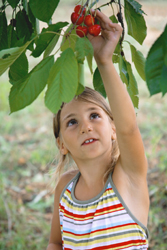Genetics of fruit development
Fruits consist of seeds enclosed in a mature ovary of a flowering plant. Through the sequential effect of different hormones, the seeds expand and cause the developing fruit to ripen. Extensive research in fruit patterning has revealed a number of molecules involved in the process. However, little is known about the molecular interactions that control this fundamental process for plant reproduction. The research plan of the EU-funded Dehicis project was to understand how networks of transcription factor genes and their target sequences control flower and fruit development, and how this varies in different species. Scientists concentrated on the study of the gene Replumless (RPL) which is required for the development of a specialised structure, the replum, involved in the opening process of the fruit to release seeds. Their primary focus was the plants of the mustard family, Arabidopsis and Brassica. Elements involved in the regulation of RPL were studied and potential variations in these regulatory sequences were investigated in terms of fruit development and pod shattering between Arabidopsis and Brassica. Scientists discovered that mutation of a single conserved element in RPL correlated with variation in replum morphology. Interestingly, this particular nucleotide change is used during rice domestication to reduce seed shattering. Additionally, components involved in the plant hormone gibberellin biosynthesis were identified. The discovered genes were studied in terms of their effect on separation layer development and on increased resistance to pod shattering. This knowledge was used in the final aim of the Dehicis project to exploit the variations found in the flower/fruit gene regulatory network for practical use. Good candidate genes to modify pod shattering in Brassica included JAGGED, and mutations in this gene were found that may be useful to reduce pod opening and seed loss. Deliverables of the Dehicis project have important implications for agriculture of Brassica plants by reducing pod shattering and thereby seed loss.




